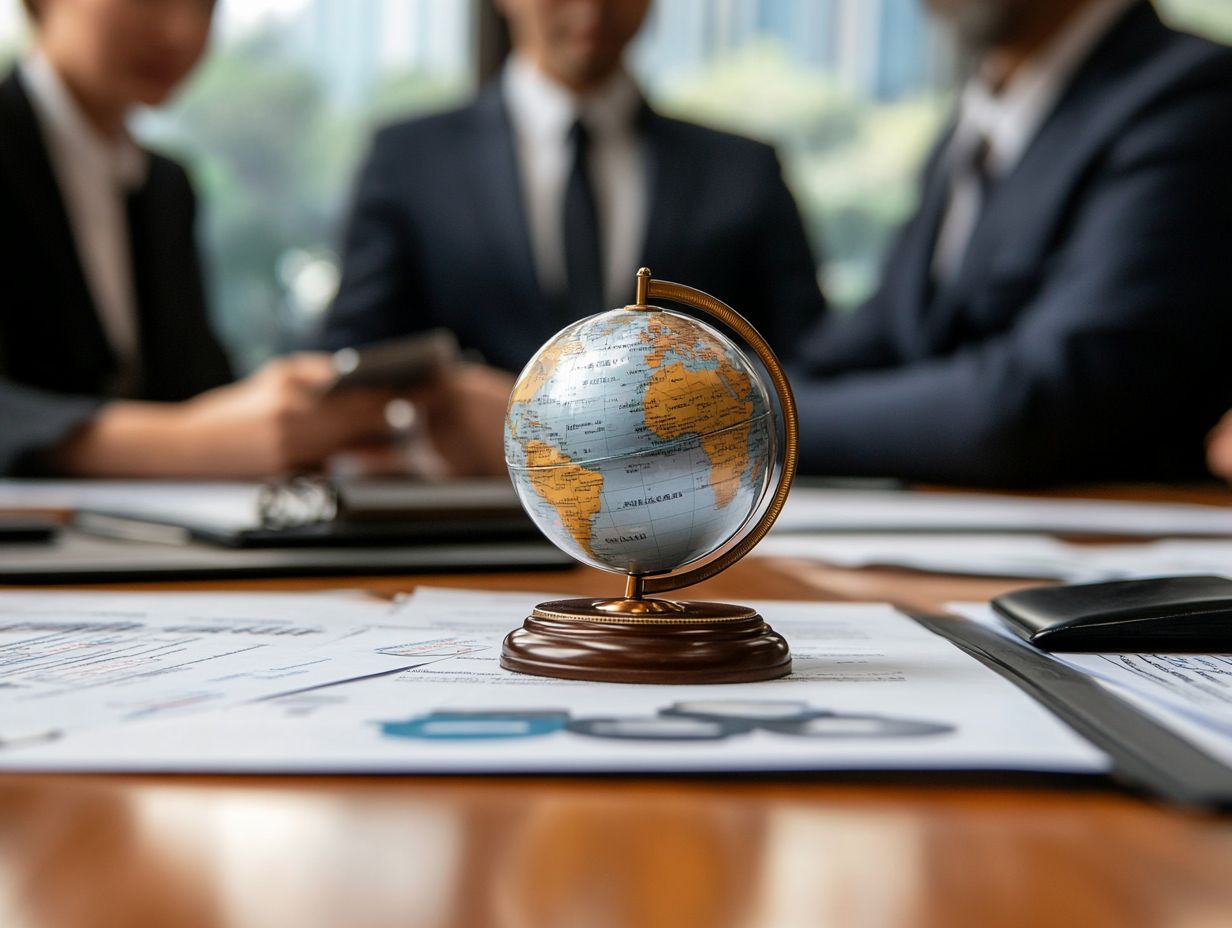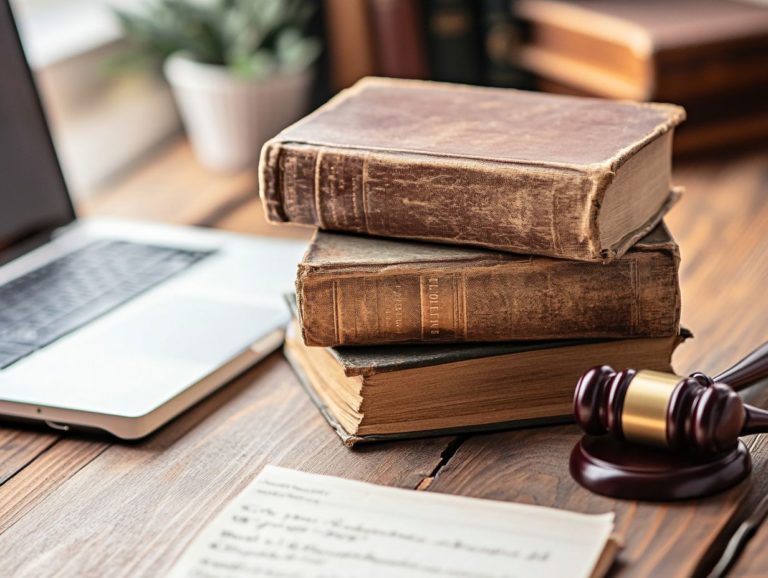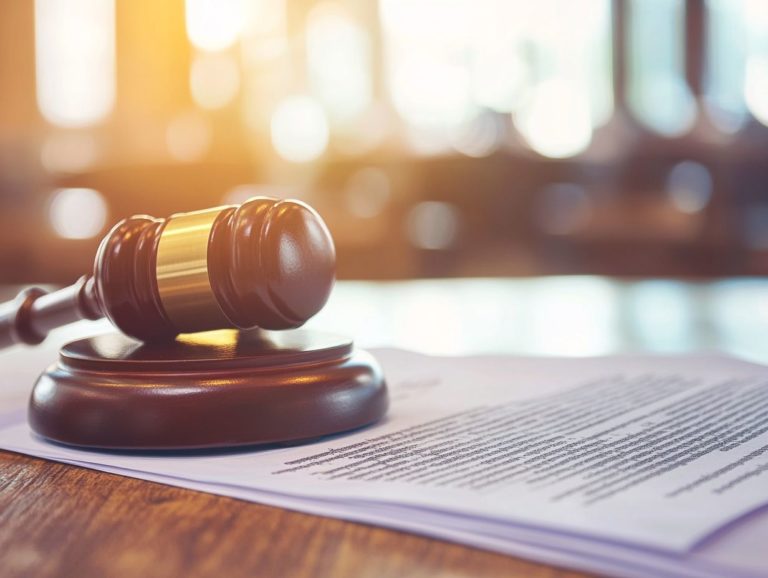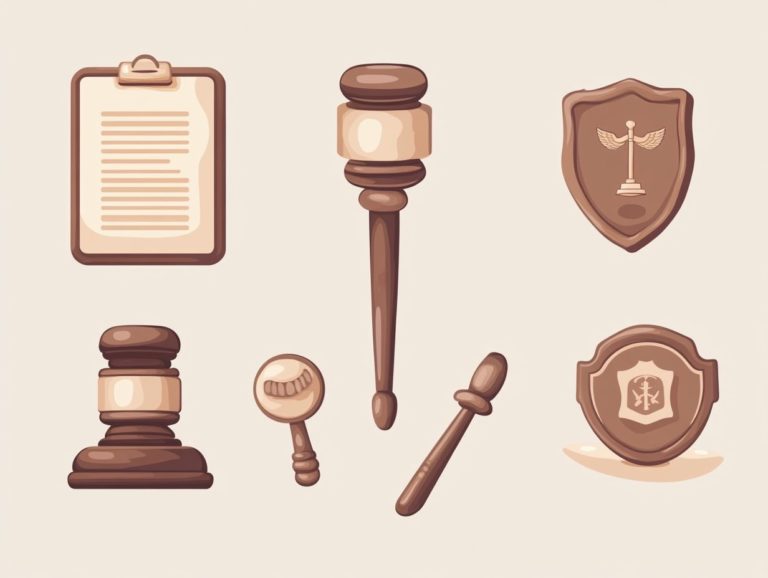How to Handle IP Litigation in Different Jurisdictions
In today s global marketplace, legal disputes over creations and inventions are a critical concern for both businesses and creators.
Understanding the challenges of IP law can be tough, as it varies significantly across jurisdictions, shaped by diverse legal systems and cultural nuances. Let s explore the key points that will help you navigate IP litigation, highlighting considerations for different regions, strategies for preparing and responding to lawsuits, and effective methods for enforcing your rights.
Whether you re an experienced professional or just stepping into this arena, grasping these intricacies will empower you to safeguard your innovations with confidence.
Contents
- Key Takeaways:
- Understanding IP Litigation
- Key Considerations for IP Litigation in Different Jurisdictions
- Preparing for IP Litigation in a Foreign Jurisdiction
- Navigating the Legal Process in Different Jurisdictions
- Enforcing IP Rights in Different Jurisdictions
- Frequently Asked Questions
- What is IP litigation and why is it important to handle it in different jurisdictions?
- What are some common challenges when handling IP litigation in different jurisdictions?
- How can I determine which jurisdiction is best for my IP litigation case?
- Do I need to hire a lawyer in each jurisdiction for IP litigation?
- What steps should I take to protect my IP rights across jurisdictions?
- What strategies can help me efficiently handle IP litigation across jurisdictions?
Key Takeaways:

- Understanding the legal systems and cultural differences in different jurisdictions is crucial for handling IP litigation effectively.
- Conduct thorough research on local laws and regulations.
- Choose appropriate legal representation when preparing for IP litigation in a foreign jurisdiction.
- Be aware of challenges in enforcing IP rights across jurisdictions and develop effective strategies for enforcement.
Understanding IP Litigation
Understanding IP litigation is essential as you navigate the intricate landscape of patent rights and intellectual property. It involves various factors, including legal frameworks, strategic considerations, and potential impacts on your business.
As your company engages more in patent litigation, it’s vital to recognize the components that can lead to successful outcomes. This includes developing effective litigation strategies, ensuring compliance with legal standards, and maintaining clear objectives throughout the process.
Being well-versed in these aspects is crucial for reducing risks and fostering organizational alignment, ultimately enabling you to manage the phases of litigation more effectively.
Definition and Overview
Patent litigation is the legal journey you embark on when seeking to enforce or defend patent rights in a court of law, all under specific patent laws.
This complex process is designed to resolve disputes surrounding the exclusive rights granted to inventors, ensuring your innovations are safeguarded from unauthorized exploitation.
In these scenarios, key players usually include patent holders, accused infringers, legal representatives, and sometimes governmental agencies that regulate intellectual property laws.
Effective legal representation is vital; the complexities of patent law can present significant challenges. An experienced attorney can guide you through the nuances of litigation and compliance, which can differ greatly across jurisdictions.
Without the right guidance, defending your rights can be difficult, or worse, you may face substantial penalties for infringement.
Key Considerations for IP Litigation in Different Jurisdictions
Navigating IP litigation across jurisdictions presents distinct challenges and considerations, as legal systems vary widely from one region to another. Understanding international jurisdiction in IP litigation cases is crucial, as this variability can significantly impact both your strategy and the outcomes of your case.
Recognizing these jurisdictional differences is essential for effective patent analysis and strategy development, particularly when cultural nuances come into play during legal proceedings.
You must tailor your litigation strategies to fit the legal frameworks and enforcement mechanisms of each jurisdiction, ensuring a cohesive approach that mitigates potential risks while capitalizing on opportunities for success.
Legal Systems and Cultural Differences
Legal systems vary widely from one jurisdiction to another, and understanding the cultural nuances is essential for navigating international IP disputes and engaging with stakeholders effectively.
In common law jurisdictions, for example, case law plays a pivotal role in shaping legal precedents and outcomes, creating a framework heavily reliant on prior judicial decisions. This contrasts sharply with civil law jurisdictions, where codified statutes and legal codes dominate, leading to a distinctly different handling of intellectual property disputes.
Such differences influence the strategies employed during litigation and highlight the urgency for targeted communication efforts. Successfully navigating these varied landscapes demands a keen awareness of cultural sensitivities.
By ensuring your strategies resonate with stakeholders, you can foster engagement and potentially sway the resolution of IP disputes in your favor.
Available Remedies and Ways to Enforce Your Rights

In the realm of IP litigation, understanding the available remedies and ways to enforce your rights is crucial for shaping your strategy. This knowledge can significantly influence the outcomes of patent rights disputes.
It’s important to grasp the intricacies of these remedies, which include:
- Injunctions to halt further infringement
- Monetary damages to cover losses
- The possibility of recovering attorney fees
Each jurisdiction presents its own unique influences on these mechanisms. Local laws and precedents determine how vigorously IP rights are enforced.
Thus, crafting a clear litigation strategy is essential. This approach will profoundly affect the advantages and remedies you might secure.
By anticipating outcomes specific to your jurisdiction, you can adjust your approach to maximize effectiveness and achieve your goals.
Preparing for IP Litigation in a Foreign Jurisdiction
When preparing for IP litigation in a foreign jurisdiction, you need to conduct thorough research and risk assessment. This ensures compliance with local laws and regulations, and having a solid grasp of understanding IP litigation can be invaluable.
Understanding the ins and outs of legal representation is crucial! Knowing the legal landscape such as evidence collection techniques and procedural requirements will help you develop an effective litigation strategy.
This approach will enable you to tackle potential challenges and align with the specifics of the foreign legal system.
Researching Local Laws and Regulations
Researching local laws and regulations is vital as you prepare for IP litigation in a foreign jurisdiction. These laws directly shape your litigation strategy and evidence collection process.
By understanding these laws, you clarify your rights as a patent holder and identify potential challenges during disputes. Different jurisdictions enforce varying procedures for filing and presenting evidence, significantly influencing your case outcomes.
Familiarizing yourself with local standards ensures your evidence collection aligns with legal requirements, increasing its chances of being admissible in court.
Best practices include consulting local legal experts and using rigorous documentation methods. This will preserve the integrity of your evidence and ultimately strengthen your litigation approach.
Selecting Legal Representation
Selecting the right legal representation in a foreign jurisdiction is crucial for navigating IP litigation with confidence. This is especially true when engaging expert witnesses and integrating into internal processes.
An attorney’s knowledge of local laws can significantly smooth your litigation journey. They can foresee challenges unique to that jurisdiction. Experience in patent litigation is paramount because the complexities of these cases demand a deep understanding of both legal precedents and technological intricacies.
It’s beneficial to have a legal team with a stellar track record, as they excel in managing complex cases and crafting strategies that evolve with the shifting dynamics of the court.
Incorporating expert witnesses can greatly enhance your strategy by providing compelling evidence that improves your chances of a favorable outcome.
Navigating the legal landscape across various jurisdictions requires following clear steps for filing a lawsuit and responding to claims. All of this is shaped by jurisdictional nuances and specific legal frameworks.
Understanding the phases of litigation from initial filing to resolution is crucial for effective case management and strategic planning. This ensures compliance and prepares you for every step of the process, safeguarding your business interests.
Actionable Tips
As you prepare for litigation, consider these actionable tips:
- Conduct thorough research on local laws.
- Consult with local legal experts.
- Document all evidence meticulously.
- Evaluate potential legal representation carefully.
- Incorporate expert witnesses for stronger arguments.
Conclusion
In summary, understanding the mechanisms available in IP litigation and preparing effectively for different jurisdictions is essential. To better grasp these complexities, consider navigating IP law across borders and seek legal counsel to navigate your specific situation, equipping yourself with the knowledge to protect your rights!
Filing a Lawsuit and Responding to Claims

Filing a lawsuit and responding to claims in IP litigation requires a strategic mindset shaped by local legal frameworks and your legal representation’s expertise, especially when considering how to prepare for an IP litigation case.
Understanding the procedural steps is essential for success in this domain. First, gather all relevant documentation contracts, communications, and prior agreements that support your claim.
Once you have that, filing with the appropriate court requires strict adherence to specific timelines. It is crucial to issue and serve the complaint to the other party promptly.
When responding to claims, craft a detailed answer outlining your defenses and any counterclaims. A strong litigation strategy is vital, highlighting the importance of skilled legal counsel by your side.
Your counsel will help you navigate the process, ensuring you meet all procedural requirements according to jurisdictional standards.
Attending Court Proceedings and Negotiating Settlements
Attending court proceedings and negotiating settlements are essential elements of the IP litigation process. Effective communication with key stakeholders and a thorough understanding of potential litigation outcomes are crucial.
In high-stakes situations, be acutely aware of courtroom presence; how you present yourself can influence how the judge or jury perceives your case.
Active participation goes beyond stating legal arguments; it involves keen listening, allowing you to read the reactions of everyone involved.
During settlement discussions, strategies like working together to find solutions can help pave the way for outcomes that benefit all parties.
Maintaining open lines of communication among stakeholders including clients, legal teams, and expert witnesses is crucial. This collaboration clarifies objectives and broadens the spectrum of viable solutions.
This holistic approach enhances your negotiation leverage and fosters an environment ripe for favorable litigation results.
Enforcing IP Rights in Different Jurisdictions
Enforcing IP rights across different jurisdictions poses complex challenges, especially in cross-border IP litigation. The varying legal standards and enforcement strategies can complicate litigation outcomes.
It is essential to navigate these intricacies with care and precision.
Challenges and Strategies for Enforcement
Enforcement challenges in IP litigation can greatly influence the effectiveness of your patent rights. You need strong enforcement strategies to protect your rights now!
These challenges often stem from diverse jurisdictional laws that complicate navigation through multiple legal systems, each with its own procedures and standards.
Cross-border enforcement adds complexity, particularly with respect to recognizing and enforcing court decisions in regions with underdeveloped IP frameworks.
To tackle these obstacles, consider establishing a comprehensive global patent strategy that accounts for regional differences. Exploring alternative dispute resolution methods can also be beneficial.
Engaging local legal expertise offers invaluable insights, ensuring your patent rights are vigorously defended while keeping expenditures in check.
Frequently Asked Questions
What is IP litigation and why is it important to handle it in different jurisdictions?

IP litigation refers to legal disputes related to intellectual property, such as patents, trademarks, and copyrights. It is important to handle IP litigation in different jurisdictions because these disputes can occur in multiple countries, and each jurisdiction may have different laws and procedures that could affect the outcome of the case.
What are some common challenges when handling IP litigation in different jurisdictions?
Handling IP litigation across borders presents challenges. Key issues include different legal systems, language barriers, and understanding how to research IP laws in different jurisdictions, as well as varied intellectual property protections.
Navigating these legal frameworks can also be time-consuming and costly.
How can I determine which jurisdiction is best for my IP litigation case?
The best jurisdiction depends on several factors. Consider the infringement location, the strength of your rights, and the potential damages available.
Consulting a knowledgeable IP lawyer can also provide insights on how to track IP litigation trends effectively, helping you find the most suitable jurisdiction for your case.
Do I need to hire a lawyer in each jurisdiction for IP litigation?
You should hire a lawyer in each jurisdiction of your IP litigation. Local lawyers understand regional laws and procedures, which can greatly enhance your case, especially considering the role of international law in IP litigation.
In some cases, the court may require you to have local representation.
What steps should I take to protect my IP rights across jurisdictions?
To safeguard your IP rights, register your creative ideas in each country where you do business or expect infringement.
Regularly monitor these rights and act quickly against any violations.
What strategies can help me efficiently handle IP litigation across jurisdictions?
Efficiently managing IP litigation involves thorough research of each jurisdiction’s legal systems.
Coordinate closely with local lawyers and consider alternative dispute resolution methods.
Establishing a clear communication plan is essential to ensure everyone involved stays aligned.






